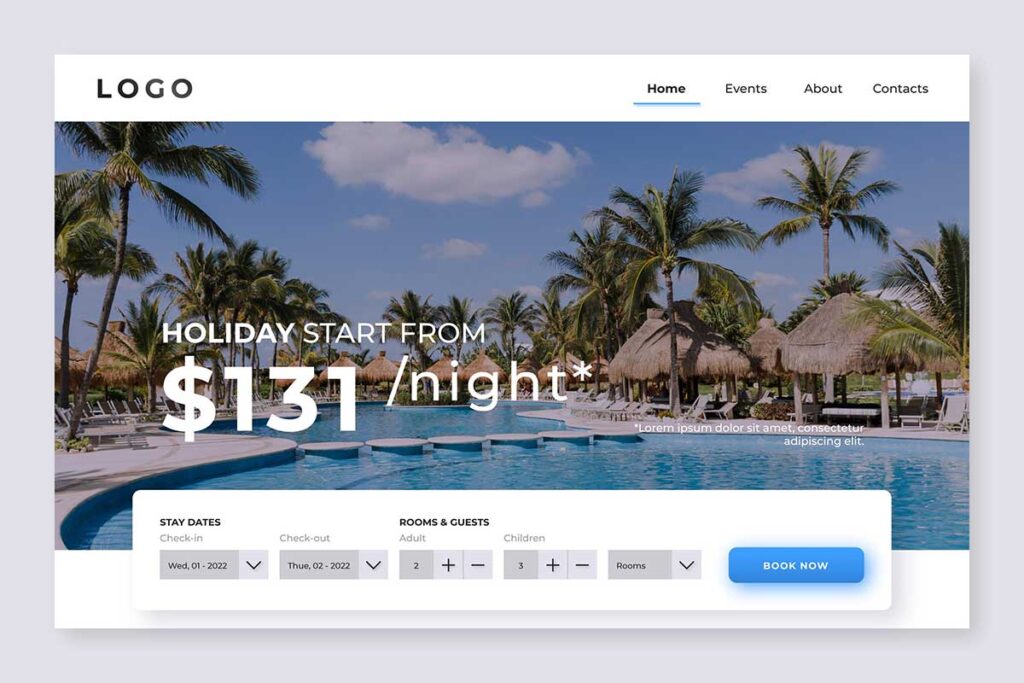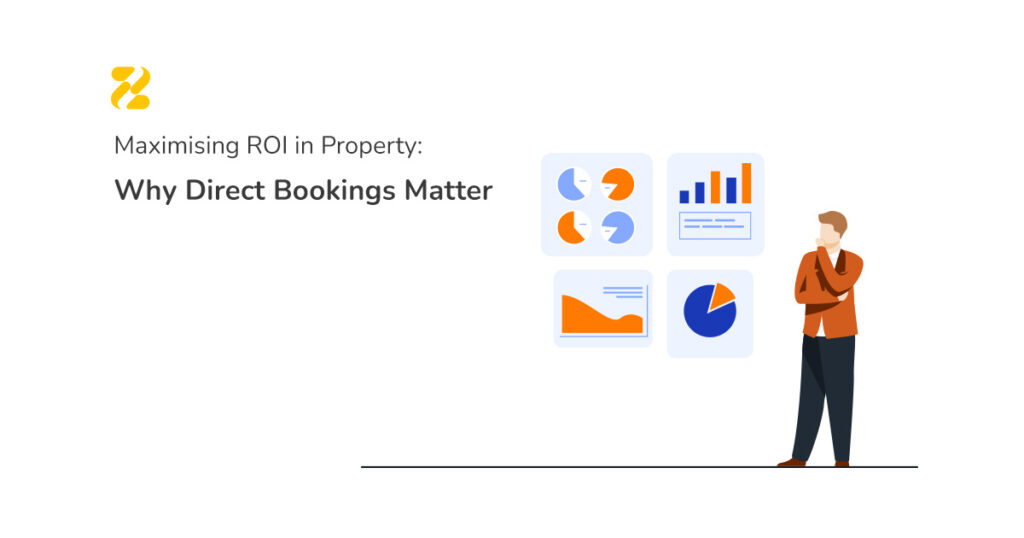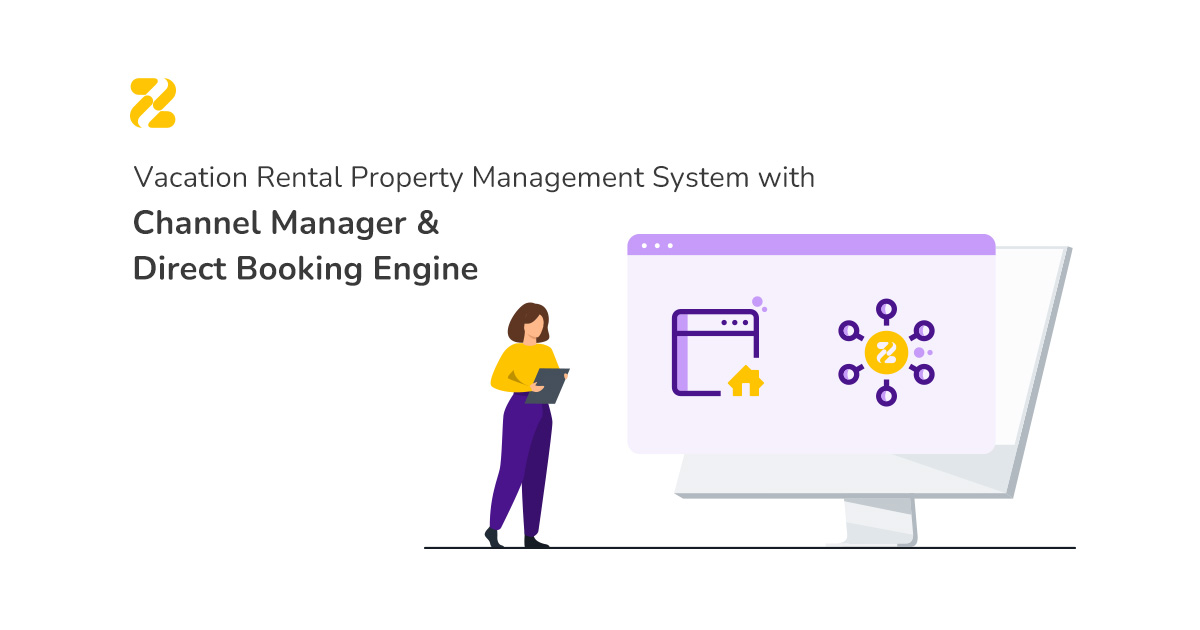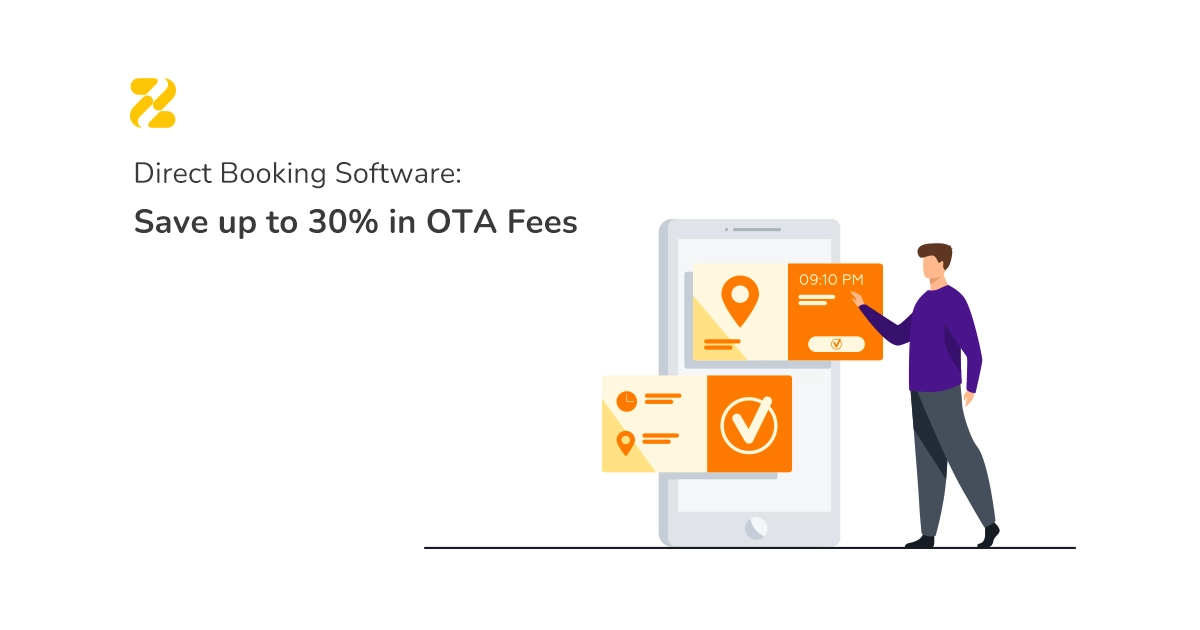In the vacation rental industry, measuring success goes beyond occupancy rates or five-star reviews – it comes down to profitability. One of the most important financial metrics for rental property owners is Return on Investment (ROI). When we talk about ROI in property, especially in short-term rentals, we’re not just referring to the property purchase itself.
For hosts with multiple properties, the choice between direct bookings and Online Travel Agencies (OTAs) significantly impacts their vacation rental ROI. While OTAs provide reach and convenience, they come at a cost. Direct bookings often yield better long-term returns due to lower fees and stronger guest relationships. This strategy secures the best ROI for a vacation rental property. But how do you track and compare these options accurately?
In this blog post, we’ll show you how to calculate ROI with a focus on direct bookings and evaluate how your booking strategy affects your property’s overall profitability.
Table of Contents
How Improving Direct Booking ROI Leads to Growth
Improving your direct booking ROI essentially means increasing the net gain from your investment in your website and associated marketing efforts.

This drives growth through several key areas:
Increased Portfolio Profitability
Direct bookings allow you to bypass the high commission fees charged by OTAs, such as Airbnb’s typical 18% host fee. For a portfolio of 10 properties generating £1 million annually, saving 18% on 50% of bookings (£500,000) translates to £90,000 in additional profit.
Cost saving through efficiency can also free up capital to reinvest, further improving profitability and enhancing the ROI in property.
Enhanced Rental Income Potential
Improving your conversion rate – the percentage of website visitors who make a booking – is key to increasing vacation rental ROI. A higher conversion rate means more bookings from the same amount of website traffic, directly boosting revenue.
Dynamic pricing tailored to each property’s market (e.g., urban vs. coastal) can increase gross booking revenue by 57%. A PMS with portfolio-wide analytics ensures consistent pricing optimisation, maximising ROI and rental income.
Scalable Marketing
Cost savings achieved through operational efficiency can be redirected to growth-focused marketing initiatives, like targeted Google Ads and strategic local SEO.
Investing in content creation, optimising your website with relevant keywords, and ensuring mobile responsiveness improve your online visibility. Using analytics tools helps refine marketing efforts for better results, ultimately supporting a higher ROI in property by driving consistent booking demand.
Building Guest Loyalty and Repeat Business
A direct booking website allows you to collect guest data, build relationships through direct communication, and offer personalised experiences.
Fostering a sense of community encourages repeat bookings and positive word of mouth referrals. This reduces the need for constant spending on new guest acquisition and boosts ROI through sustained revenue streams.
Strengthened Brand Identity
A dedicated website allows you to fully control and showcase your brand identity and unique property features. Building a cohesive, trusted brand through your website and consistent guest experiences builds confidence and turns visitors into repeat guests.
Operational Efficiency at Scale
A PMS with a built-in direct booking engine, centralises operations for multiple properties, automating tasks, like pricing, enquiries, and payments. This reduces labour costs by 10–20 hours/property/month (£1,800–£3,600 annually for 10 properties at £15/hour).
Scalable systems allow you to manage more properties without proportionally increasing staff, supporting efficient growth while improving the ROI for property.
Competitive Advantage and Control
Analytics from a direct booking platform provide insights into portfolio performance (e.g., conversion rates, occupancy, ADR). This enables data-driven decisions on pricing, marketing, and property improvements across all units.
Direct bookings also reduce reliance on OTA policies, offering stability and control, which are critical for multi-property management.
Ready to optimise your direct bookings and increase your vacation rental ROI? Explore Zeevou’s solutions now!

How to Calculate ROI for Direct Bookings
The basic formula for calculating ROI is:
ROI = Net Gain / Implementation Cost
To use this formula for your direct booking website and calculate the ROI in property ownership, you need to:
1. Identify the Costs
Start by identifying all expenses associated with setting up and running your vacation rental website. This includes both one-time setup fees and ongoing maintenance expenses. Don’t forget the marketing spend, such as paid ads (Google, Meta), SEO, content creation, and email automation. These efforts are part of your investment towards generating bookings.
Also consider operational costs tied to managing direct bookings. These might include staff time, tools for handling enquiries and payments, and any manual coordination. All these should be included when estimating your total investment to ensure an accurate assessment of the ROI in property.
2. Identify the Gains
Gains come from direct bookings across all properties, bypassing OTA commissions. For a portfolio with £1 million in bookings, shifting 50% (£500,000) to direct channels saves £90,000 at an 18% commission rate.
To get a more accurate ROI, consider factors like your target direct booking share, occupancy rate, ADR, and number of properties.
How to Track ROI in Property
Increasing and tracking vacation rental ROI is largely “about conversion”. You need to ensure your website converts visitors into bookings as much as possible.
Track Conversion Rate
Direct bookings enable you to use conversion rates as a metric for assessing your website’s effectiveness. Analysing conversion rates provides insights into your website’s performance and areas for improvement. Tracking this metric helps gauge how well your website design, user experience, and marketing strategies are converting visitors.
Data-driven insights from conversion analysis can help refine strategies to increase rental income from direct bookings.While conversion rates are key, multi-property hosts may also prioritize KPIs like portfolio NOI (Net Operating Income), occupancy, or capitalisation rate.
Website Performance Tools
You can use tools like Google Analytics to track website traffic, user behaviour, and conversion rates. These insights show which pages perform well and which need tweaks to boost property ROI by improving the booking process.
Additional tools, such as Google Tag Manager and Search Console help track user actions and optimize site content and visibility.
Integrated Booking Engines
A PMS with a built-in direct booking engine can help track traffic and conversions without extra per-booking fees. Integrated booking engines make tracking the gains from direct bookings relatively straightforward.
Marketing Campaign Tracking
You should track your marketing campaigns and their results to ensure they are worthwhile. A/B testing can be used to understand which advertisements or promotions are more effective for your website.
Tools like Mailchimp can track email campaign performance, including open rates, click-through rates, and conversions. This helps refine your marketing efforts and boost ROI in property through cost-effective guest acquisition.
Vacation Rental ROI Calculators
There are several ROI calculators available online that can help you estimate the return on investment from your direct booking website. These tools let you enter key metrics, like setup costs, marketing spend, and average booking value. They then estimate your ROI based on the number of direct bookings.
Ready to optimise your direct bookings and increase ROI in property? Explore Zeevou’s solutions now!

ROI Comparison: Direct Bookings vs OTAs
The ROI difference between direct bookings and OTAs comes down to costs and control. These factors directly affect the “Net Gain” and “Implementation Cost” in the ROI formula.
Costs and Fees
OTAs
Relying on OTAs means paying high commission fees and booking charges that significantly reduce your profits. These fees eat into your revenue with each booking, limiting the property ROI by decreasing the net gain from each rental.
Direct Bookings
With your own direct booking website, there are no such commissions. This means you keep more of your rental income, enjoy higher margins, and ultimately achieve improved profitability with every direct booking.
However, It’s important to check whether your website provider takes a commission on direct bookings. If they do, compare their fees with those charged by OTAs to determine the actual cost savings and benefits of using your own site.
Gains and Revenue
OTAs
OTAs like Airbnb offer access to a massive user base and global reach, helping to increase occupancy rates. They also handle marketing (advertising, email, SEO) and payment processing, which can drive bookings without a major marketing investment on your part.
In 2024, Airbnb accounted for 46% of bookings, while direct booking sites accounted for nearly 34%.
Direct Bookings
Direct bookings provide gains from leads generated and converted directly through your website. The amount gained from these direct bookings is a key part of your total gains, boosting the ROI in property.
Direct booking websites help owners build guest loyalty, increase repeat bookings, and take control of marketing and rental income. Additionally, direct bookings have lower cancellation rates compared to OTAs. A study showed an 18% cancellation rate for direct bookings versus 34% for OTA bookings, suggesting direct bookings are more reliable.
By eliminating OTA fees, owners can offer better deals and incentives directly to guests, further incentivising direct bookings.
Investment and Control
OTAs
Listing on OTAs is relatively straightforward for getting started, leveraging their established platform and tools. However, you have limited control over policies (like cancellations), guest screening, and how your listing is presented. You also face challenges building your own brand or accessing guest data for direct marketing.
Direct Bookings
Building a strong direct booking ecosystem requires investment. This often includes the initial setup cost of your website and ongoing maintenance costs. You may need to invest in marketing efforts like SEO, PPC, social media, and email campaigns, to drive traffic and conversions.
However, this investment grants you complete control over your branding, listings, cancellation policies, guest screening, and the overall guest experience. Savings from reduced property management costs can be invested in growth-focused marketing for direct bookings.
A PMS with a built-in and free direct booking engine like Zeevou can help consolidate tools and reduce costs, supporting a robust direct booking strategy.
Conclusion
OTAs provide great reach and convenience, but their fees cut into your profits and lower your ROI in vacation rentals. Direct bookings require an upfront and ongoing investment in your website and marketing, but they eliminate commissions and let you keep more revenue. You’ll gain control to build guest relationships and your brand, which can lead to higher long-term profitability and a stronger ROI in property.
Instead of choosing one, vacation rental businesses should diversify by utilising both OTAs and a direct booking website. To make informed decisions, it’s essential to track and review your vacation rental ROI regularly for each booking channel. This helps you identify which sources are most profitable over time and adjust your strategy based on real performance, not assumptions.
Looking to increase your direct bookings and boost your ROI? Try Zeevou’s solutions, which help you take control, cut costs, and grow your vacation rental business.
Image by pch.vector on Freepik.




